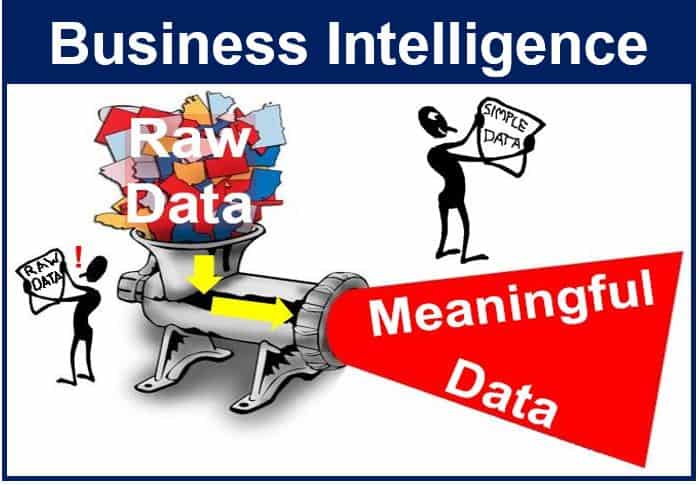Business intelligence or BI is a series of tools and techniques we use to transform raw data into useful and meaningful information. This information can help companies gain an edge in the marketplace. In other words, business intelligence can help companies compete more effectively.
Business intelligence helps managers make better decisions by analyzing their company’s historical information. From that data, they can project possible future trends.
Do not confuse the term with competitive intelligence. Competitive intelligence is all about data from external sources.
Business Intelligence, on the other hand, is mainly the management of a company’s internal data. Some people, however, may give BI a wider meaning. In that wider meaning, they include some aspects of competitive intelligence.
BI technologies can handle huge amounts of raw data. This data subsequently helps us identify, develop, and create new strategic business opportunities.
Moreover, advanced BI tools are now incorporating artificial intelligence and machine learning to automate data analysis, enhancing the speed and accuracy of strategic decision-making.

Business intelligence – past and current raw data
The aim of business intelligence is to turn these massive volumes of data into meaningful information. Above all, information that people can understand and use.
BI can detect behavioral patterns from which we can anticipate future patterns. This allows us to determine what actions to take well in advance.
After turning raw data into something that can help us identify new opportunities, we put effective strategies into motion. All this subsequently provides companies with a competitive edge. It also gives them long-term stability.
BI technologies gather and process historic and current data on business operations, analyze them, and make predictions.
Business intelligence has many uses
Business intelligence can help managers make decisions regarding a wide range of business issues. For example, it helps them position and price a product, as well as deciding on operations.
In fact, BI can even help us make strategic decisions.
Larger companies have their own in-house business intelligence group, while others will hire an outside agency.
Business intelligence experts gather data from within the company. They focus on how well the company has been performing and where they could make improvements.
In addition to performance analysis, BI also facilitates risk management by identifying potential threats and inefficiencies within the company’s operations.
The experts then analyze outside sources, which may include data on competitors, customer survey information, and **market analysis by third parties.
** Market analysis refers to research on any market that aims to predict the direction of growth rates or prices.
Examples of business intelligence
Christine McGeever, writing in COMPUTERWORLD, gave the following two examples of BI applications being used by companies.
-
Example 1 – a hotel franchise company
With BI analytical applications, a hotel franchise company compiles statistics on average occupancy and room rates. It wants to work out revenue generated per room.
The company can also gather data on market share and customer surveys to gauge its competitive position in several markets.
People analyze all this information on an annual, monthly, and even daily basis. The data gives the franchise owner a good picture of how each hotel is performing.
- Example 2 – a bank
A bank uses BI software to bridge a legacy database with departmental databases. It does this so that branch managers and other banking staff can determine who the most profitable customers are. In other words, it helps them determine which ones they should focus on when selling new products.
Ms. McGeever wrote:
“The use of these tools frees information technology staff from the task of generating analytical reports for the departments, and it gives department personnel autonomous access to a richer data source.”
Business intelligence – over 150 years old
Rob Meredith wrote in the Monash University Business Intelligence Blog that the term ‘business intelligence’ dates back to 1865. In that year, Richard Millar Devens used the term in his book ‘Cyclopædia of Commercial and Business Anecdotes’ (page 210).
Sir Henry Furnese profited by receiving information about his environment before his competitors and acting on it. Regarding Furnese’s actions, Devens wrote:
“Throughout Holland, Flanders, France, and Germany, he maintained a complete and perfect train of business intelligence.”
“The news of the many battles fought was thus received first by him, and the fall of Namur added to his profits, owing to his early receipt of the news.”
Market intelligence is another area where corporations spend money and resources. It is all about gathering and analyzing data on competitors, customers, and products.
Compound phrases with ‘business intelligence’
In English, there are many compound phrases with the term ‘business intelligence’ included in them. Here are five examples:
-
Business Intelligence Tools
Software applications used to process and analyze corporate data. As in:
“The company implemented new business intelligence tools to better understand customer buying patterns.”
-
Business Intelligence Analytics
The process of analyzing business data to gain insights. For example:
“Through business intelligence analytics, we identified a significant untapped market segment.”
-
Business Intelligence Strategy
A plan outlining how a company will use data analysis to achieve its goal. For instance:
“Our business intelligence strategy focuses on improving customer retention rates using data-driven decision-making.”
-
Business Intelligence Dashboard
A visual interface displaying key business metrics and data points. For example:
“The CEO regularly checks the business intelligence dashboard to monitor real-time sales performance.”
-
Business Intelligence Reporting
The process of generating actionable reports from business data. As in:
“Monthly business intelligence reporting helps the team track progress against our quarterly objectives.”
Video – What is Business Intelligence?
This educational video, from our sister channel on YouTube – Marketing Business Network, explains what ‘Business Intelligence’ is using simple and easy-to-understand language and examples.
